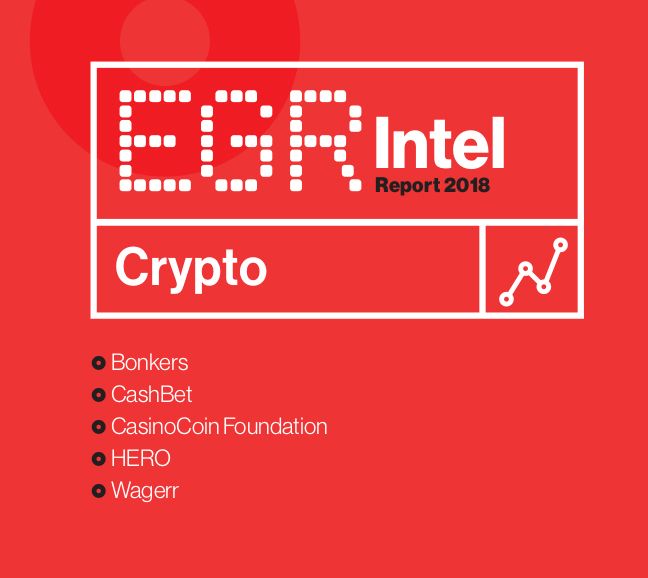Industry journal features Wagerr!

Sports betting industry executives rely on two trade publications: EGR and Gambling Insider. So, when EGR launched their first crypto edition, Wagerr was proud to be featured, knowing the interview (see below!) would reach leaders in the space.

At the 2017 European iGaming Congress & Expo (EiG), where Wagerr Founder, David Mah, was a featured speaker, the presence of the blockchain revolution was a palpable game changer. Following the conference, EGR publish their first annual "Crypto Edition." Check out the interview:
A revolutionary network
EGR Intel (EGR): What is Wagerr?
Wagerr: Wagerr is a revolutionary sports betting network which utilizes blockchain technology. We originally started our planning phase in August of 2016. In June 2017, our record-breaking Initial Coin Offering (ICO), which is similar to a crowdfund, raised more money than any sports betting project to date. We then launched our custom blockchain in February of 2018, and we are currently testing our first phase, H2H, before release in the coming months.
The Wagerr Sports Betting Network is comprised of multiple features in one ecosystem. Head to Head (H2H), our first phase, is comparable to a traditional P2P betting exchange. Multi-user, our second phase, is most similar to Betfair’s cross-matching system. And finally, our third phase, on-chain betting, is similar to a traditional sportsbook with a full futures market.
EGR: How does Wagerr use blockchain technology?
Wagerr: Blockchain, also known as digital ledger technology, is a digital ledger, or continually growing list, if you will, of records called ‘blocks’, which are linked and secured using cryptography. Each block contains a cryptographic hash of the previous block, a timestamp, and transaction data. By design, a blockchain is inherently resistant to modification of the data, which is what makes blockchain or DLT a preferred choice, and the future of the sports betting industry. Wagerr is on the forefront of this technology in our industry.
EGR: So, the network takes the place of the traditional bookmaker as the ‘middle man’?
Wagerr: Correct. In all three phases, the blockchain is powered by 2,000 Oracle Masternodes that are run by ‘the people’. Basically, anyone who reserves 25,000WGR coins, and has access to a virtual private server (VPS). The Oracle Component connects to an outside source, and brings data back to the blockchain. In our case, that would be a Live Sports Results Data Feed (API). That user then gets compensated for grading and processing betting tickets for the network. Depending on betting volume, an Oracle Masternode operator can make upwards of $150,000+ per year.
EGR: Who are Wagerr’s competitors?
Wagerr: There are a few other blockchain-based sportsbooks, but we’re the only company, at this point, that is crazy enough to try to pull off a fully decentralized betting network, run by Oracle Masternodes, that are owned by the people and run in 50+ different countries around the world.
EGR: What benefits does the blockchain bring to a sports betting platform, and what makes Wagerr different from its competitors?
Wagerr: The fact that our blockchain is powered by Oracle Masternodes, which are essentially run on 2,000 different servers located around the world, removes the risks associated with other centralized sportsbooks. A typical sportsbook is run on one, maybe even five, or at max, 10 different servers, which are usually all located in the same country, same city, and most of the time, same building. They are easy to attack.
A government could even come in and decide they want to bring down said centralized sportsbook for whatever reason. Shutdown the server, shutdown the book. But in the case of Wagerr, once the network is up and running, the whole Wagerr team could die in a fiery plane crash, the network would still run as usual, and you’d still be able to pull your winnings. That’s the difference between being dependent on a centralized entity, and the power of a decentralized entity.
EGR: Wagerr also has its own cryptocurrency coin (WGR) – how is that connected to the blockchain and what is the coin used for?
Wagerr: The Wagerr Coin is a very powerful piece of the Wagerr puzzle. We use a mechanism called “value coupling.” Wagerr charges a modest fee for betting services, just like traditional bookkeepers. But unlike mainstream bookkeepers, the Wagerr blockchain systematically destroys almost half of every fee. Since this reduces the coin supply, increased adoption of Wagerr as the sports betting blockchain of choice gradually drives up the market value of Wagerr. What’s good for bettors is great for investors; it’s a simple matter of supply and demand. In simple terms, you will make money just by keeping Wagerr in your wallet.
EGR: How does Wagerr handle users’ privacy?
Wagerr: Wagerr is a decentralized, pseudonymous sportsbook. The software doesn't need any personal information to function. Since it doesn't collect any information, there's no private information to handle.
EGR: Who are Wagerr’s targeted users?
Wagerr: In simple terms? Everyone. To get a bit deeper? The people that I personally feel could use Wagerr the most, are those who live in countries with extreme regulation. Also, professional bettors who have been limited or banned from numerous sportsbooks for winning too much. Lastly, sportsbooks that are looking to limit liability. Since we will have the lowest fees in the world, there’s no better place to achieve this for sportsbook operators.
EGR: Where do you see Wagerr in 10 years?
Wagerr: I honestly see Wagerr as the number one preferred sports betting network in the world. I realize that there’s a lot of work still left to be done in order to achieve this lofty goal, but when development is complete, you will need 4-5 different sportsbooks to do the same things you could do under one umbrella, in the Wagerr network.
